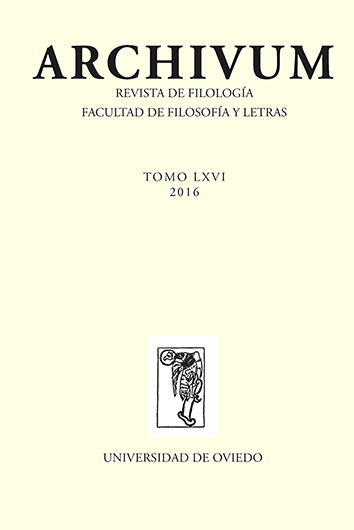Resumen
La imagen de la madre africana vertida por los primeros escritores del continente, lejos de mostrar la realidad de la maternidad, contribuye al fomento de una imagen negativa para la mujer, que ve sometido el desarrollo de su identidad individual a su papel de madre. Escritoras africanas, como Ama Ata Aidoo, han luchado desde la década de 1960 contra el uso de este papel como herramienta política y social, plasmando cómo la imagen de ‘la Madre África’ no hace más que someter a la mujer africana. Este artículo estudia los distintos conceptos de maternidad que Aidoo establece y cómo la autora ghanesa reapropria la maternidad a través de sus obras.
PALABRAS CLAVE: Aidoo, maternidad, símbolo político, reapropiación, África.
Citas
ADLER, PETER S. “Beyond Cultural Identity: Reflections on Cultural and Multicultural Man”, Culture, Communication and Conflict: Readings in Intercultural Relations, Gary R. Weaver, ed., Needham Heights, Simon & Schuster Custom Publishing, 1996, págs. 241-259.
AIDOO, AMA ATA. Our Sister Killjoy or Reflections from a Black-eyed Squint, Hong Kong, Longman, 1990.
---. No Sweetness Here and Other Stories, New York, The Feminist Press, 1995.
ASANTE, SAMUEL YAW. In My Mother’s House: A Study of Selected Works by Ama Ata Aidoo and Buchi Emecheta, Calgary, University of Calgary, Libraries and Cultural Resources, 2000, <http://dspace.ucalgary.ca/handle/1880/39677>.
BRAHIMI, DENISE Y ANNE TREVARTHEN, Les femmes dans la littérature africaine: portraits, Paris, Karthala, 1998.
BRYCE, JANE Y KARI DAKO, “Textual Deviancy and Cultural Syncretism. Romantic Fiction as a Subversive Strain in Africana Women’s Writing”, Arms Akimbo: Africana Women in Contemporary Literature, Janice Liddell y Yakini Belinda Kemp, eds., Gainesville, Florida U.P., 1999, págs. 219-229.
CAWS, PETER. “Identity: Cultural, Transcultural, and Multicultural”, Multiculturalism. A Critical Reader, David Theo Goldberg, ed., Oxford, Blackwell Publishers, 1996, págs. 317-387.
CORNELL, STEPHEN Y DOUGLAS HARTMANN. Ethnicity and Race. Making Identities in a Changing World, Thousand Oaks, London, Pine Forge Press, 1998.
CUSHNER, KENNETH Y RICHARD W. BRISLIN. Intercultural Interactions. A Practical Guide, 2ª ed., London, SAGE Publications, 1996.
ELDER, ARLENE A. “Ama Ata Aidoo: The Development of a Woman’s Voice”, Emerging Perspectives on Ama Ata Aidoo, Ada U. Azodo y Gay Wilentz, eds., Trenton, Africa World Press, 1999, págs. 157-169.
FANON, FRANTZ. Black Skins, White Masks, New York, Grove Press, 1967.
FONCHINGONG, CHARLES C. “Unbending Gender Narratives in African Literature”, Journal of International Women’s Studies, Vol. 8, 1 November 2006, <http://www.bridgew.edu/Soas/jiws/Nov06/Gender Narratives.pdf>.
HADJITHEODOROU, FRANCISCA. Women Speak: The Creative Transformation of Women in African Literature, 1999, <http://upetd.up.ac.za/thesis/available/etd-08022006-130211/unrestricted/00front.pdf>.
HILL-LUBIN, MILDRED A. “Ama Ata Aidoo and the African Diaspora: Things, ‘All Good Men and Women Try to Forget,’ but I Will Not Let Them”, Emerging Perspectives on Ama Ata Aidoo. Ada U. Azodo y Gay Wilentz, eds., Trenton, Africa World Press, 1999, págs. 45-60.
HORNE, NAANA B. “The Politics of Mothering: Multiple Subjectivity and Gendered Discourse in Aidoo’s Plays”, Emerging Perspectives on Ama Ata Aidoo. Ada U. Azodo y Gay Wilentz, eds., Trenton, Africa World Press, 1999, págs. 303-331.
INNES, C. L. “Mothers or Sisters? Identity, Discourse and Audience in the Writing of Ama Ata Aidoo and Mariama Bâ”, Motherlands, Susheila Nasta, ed., London, The Women’s Press, 1991, págs. 129-151.
JAMES, ADEOLA. In their own voices. African Women Writers Talk, London, James Currey Ltd, 1990.
KERKHOFF, INGRID. Ama Ata Aidoo, Universitat Bremen, 2006, <http://www.fb10.uni-bremen.de/anglistik/kerkhoff/AfrWomenWriters/Aidoo/Aidoo.html>.
MPHAHLELE, EZEKIEL. “Introduction,” No Sweetness Here, 2d ed., Garden City (NY), Doubleday, 1972, págs. xix-xx.
NASH, MARY. “Maternidades y Construcción Identitaria: Debates del S.XX”, XIV Coloquio Internacional de la AEIHM - I Coloquio Internacional Grupo Deméter. “Maternidades. Discurso y Prácticas Históricas”, Oviedo, 2008/11/06.
NICHOLSON, MARY NAANA. The Affirmation of African Womanhood in the Works of Ama Ata Aidoo, University of Florida, Master’s Thesis, 1983.
O’BRIEN, LOUISE. “Buchi Emecheta and the ‘African Dilemma’”, The Journal of Commonwealth Literature, 2001, <http://jcl.sagepub.com/cgi/reprint/36/2/95>.
ODAMTTEN, VINCENT O. The Art of Ama Ata Aidoo. Polylectics and Reading Against Neocolonialism, Gainesville, Florida U.P., 1994.
OGUNDIPE-LESLIE, MOLARA. “The Female Writer and Her Commitment”, Women in African Literature Today, Eldred Durosimi Jones, Eustace Palmer y Marjorie Jones, eds., London, James Currey Ltd, 1987, págs. 5-13.
PIETERSE, COSMO Y DENNIS DUERDEN, eds. African Writers Talking: A Collection of Radio Interviews, New York, Africana, 1972.
REBOUSSIN, DAN. Aidoo, Africana Collection, Georges A. Smathers Libraries, University of Florida, 2003, <http://web.uflib.ufl.edu/cm/africana/aidoo.htm>.
ROONEY, CAROLINE. “‘Dangerous Knowledge’ and the Poetics of Survival: A Reading of Our Sister Killjoy and A Question of Power”, Motherlands, Susheila Nasta, ed., London, The Women’s Press, 1991, págs. 99-125.
SAIDI, CHRISTINE. “The Patriarchal Myth: Deconstruction and Reconstruction”, Women’s Authority and Society in Early East-Central Africa, Rochester, University of Rochester Press, 2010, págs. 7-22.
SCHIPPER, MINEKE. “Mother Africa on a Pedestal: The Male Heritage in African Literature and Criticism”, Women in African Literature Today, Eldred Durosimi Jones, Eustace Palmer y Marjorie Jones eds., London, James Currey Ltd, 1987, págs. 35-54.
STINE, PETER WILFRED. “The Language of Endurance in the Short Stories of Ama Ata Aidoo”, Emerging Perspectives on Ama Ata Aidoo, Ada U. Azodo y Gay Wilentz, eds., Trenton, Africa World Press, 1999, págs. 255-263.
VALDÉS GUÍA, MIRIAM. “La maternidad en el politeísmo griego. El caso de la Tierra”, XIV Coloquio Internacional de la AEIHM - I Coloquio Internacional Grupo Deméter. “Maternidades. Discurso y Prácticas Históricas”, Oviedo, 2008/11/06.
WEAVER, GARY R. “The Process of Reentry”, Culture, Communication and Conflict: Readings in Intercultural Relation, Gary R. Weaver, ed., Needham Heights, Simon & Schuster Custom Publishing, 1996, págs. 229-240.
WILENTZ, GAY. “African Woman’s Domain: Demarcating Political Space in Nwapa, Sutherland and Aidoo”, Emerging Perspectives on Ama Ata Aidoo, Ada U. Azodo y G. Wilentz, eds., Trenton, Africa World Press, 1999a, págs. 265-279.
---. “The Politics of Exile. Ama Ata Aidoo’s Our Sister Killjoy”, Arms Akimbo: Africana Women in Contemporary Literature, Janice Liddell y Yakini Belinda Kemp, eds., Gainesville, Florida U.P., 1999b, págs. 162-175.

